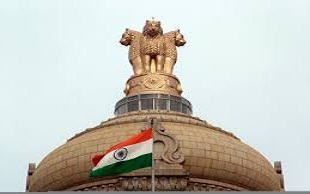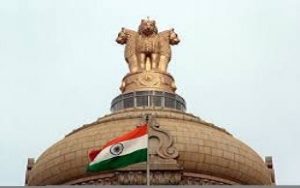Union Cabinet Approves Ordinance to amend Payment of Wages Act, 1936
The Centre approved a draft ordinance on December 21, 2016, to empower states and enable industries to pay wages by cheque or by direct credit into bank accounts of workers earning up to Rs. 18,000 a month, without taking their explicit consent.
- The Union Cabinet approved the ordinance to amend the Payment of Wages Act, 1936, to allow employers of certain industries to make payment through the electronic mode and cheques.
- The aim of the move is to enable companies to ensure timely payment of wages to workers at a time when there is cash crunch due to demonetisation of Rs. 1,000 and old Rs. 500 and reduce the complaints regarding non-payment or less payment of minimum wages
- However, the wage payment through the banking system would only be optional, until State governments or the Centre come up with an official notification for specific industries to make payment of wages through cheques or direct credit in bank accounts.
- The current provisions of payment of wages through cash will remain valid.
- The government proposes to bring an amendment to the Section 6 of the Payment of Wages Act, 1936 to encourage cashless transactions. It will need the President’s assent to become law as per article 123 of the Constitution.

- The Act had come into force on April 23, 1936, providing for payment of wages in coin or currency notes, or in both. The provision for payment of wages by cheque or crediting it into bank account after obtaining the requisite authorisation of employee was inserted in 1975.
- The present law (1936 Act) states that all payment of wages should be in cash. Under it has mandatory provision asking employers to obtain written permission of the worker to pay either by cheque or by crediting wages to his or her bank account. Authorisation of the employee would not be required after the law comes into effect.
CCEA approves doubling of Rajpura-Bhatinda railway line
The cabinet committee on economic affairs (CCEA) gave its approval for doubling of Rajpura-Bhatinda railway line at an estimated cost of Rs. 1,251.25 crore.
- The doubling of railway line is expected to be completed in five years. The 172.64km long railway line will benefit the districts of Patiala, Sangrur, Barnala and Bathinda.
- It would also ease the traffic bottlenecks and bring more revenue to Indian railways by capacity enhancement of the route.
- The expected completion cost of the project is Rs. 1,465.59 crore.
Union Cabinet approves sale of part of HAL’s surplus, vacant land
The Union Cabinet on December 21, approved the sale of part of surplus and vacant land of 87.70 acres at Pimpri in Pune, Maharashtra to meet Rs. 821.17 crore net liabilities of Hindustan Antibiotics Ltd (HAL).
- The approval will help the government in optimum utilization of the assets of the company and will facilitate mitigation of sufferings and critical condition of the employees.
- It will also help the government to take decisions in respect of rehabilitation, strategic sale or closure of the company.
HAL
Hindustan Antibiotics Limited, based in Pimpri, India, is the first public sector drug manufacturing companies set up by the Government of India. It was the first company in India to launch a recombinant DNA product, rHU-Erythropoietin in 1993.
- Headquarters: Pimpri-Chinchwad
- Founded: March 10, 1954
For the first time NSG may participate in Republic Day Parade
The elite counter-terror force, National Security guard (NSG) may participate in the Republic Day celebrations on January 26, 2017 at Rajpath for the first time in the history.
- Decision in this regard was taken after a meeting between the Union Home and Defence Ministries following which the National Security Guard (NSG) began preparations to choose a contingent of about 60 commandos to showcase its prowess and commando-style fast march past.
- Till now the troops of Armys Special Forces were the only commando force to take part in the Rajpath during January 26 celebrations.
- The NSG contingent is expected to include commandos from both the army and paramilitary-based units of the force.
About NSG
The National Security Guard (NSG) is an Indian Special Forces unit under the Ministry of Home Affairs (MHA). It was raised in 1984, following Operation Blue Star and the assassination of Indira Gandhi.
- It is responsible for combating terrorist activities with a view to protect states against internal disturbances.
- The NSG personnel are often referred to as Black Cats because of the black dress and black cat insignia worn on their uniform.
Cabinet To Launch toll-free number 10588 for pregnant women
The union government will soon set up a toll-free number 10588 to provide relevant information and guidance directly to the pregnant women.
- This toll-free number will be functional at Mother and Child Tracking Facilitation Centre (MCTFC) in New Delhi.
- The caller can give a missed call at this number and the operator will call back within 90 seconds to address their queries.
- The call centres will spread awareness about and promoting health initiatives also provides the necessary foundation for tracking the pregnant women and children to assist them in availing timely and full range of healthcare services.
About MCTFS
The Mother and Child Tracking Facilitation Centre (MCTFS) was set up at National Institute of Health and Family Welfare in 2014 and it is a centralized web-based application which captures the name based data of pregnant women and children.
- MCTFS contacts the service providers and recipients of mother and child care services to get their feedback on various mother and child care services, programmes and initiatives.
- More than 37 lakh beneficiaries have been contacted through this centre for data validation, promotion and facilitation in availing maternal and child health services.






